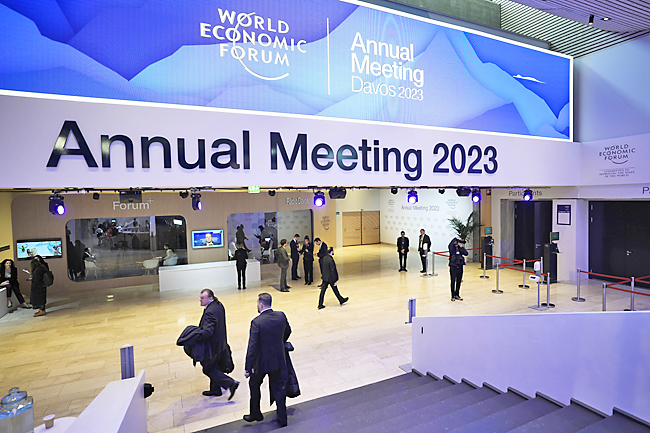Danial Norjidi
A new World Economic Forum (WEF) report was recently released, with key findings including that a majority of the WEF’s Community of Chief Economists expect a global recession in 2023, see geopolitical tensions continuing to shape the global economy, and anticipate further monetary tightening in the United States (US) and Europe.
Launched at the WEF Annual Meeting, the January 2023 Chief Economists Outlook is described as aiming “to summarise the emerging contours of the current economic environment and identify priorities for further action by policymakers and business leaders in response to the compounding shocks to the global economy from geo-economic and geo-political events”.
According to the report, although there are some grounds for optimism, such as easing inflationary pressures, many aspects of the outlook remain gloomy. “Policymakers continue to confront an array of difficult trade-offs, while households and businesses will need to adapt to persistent headwinds throughout 2023,”it said.
Almost two-thirds of respondents considered a global recession to be likely in 2023, including 18 per cent who considered it extremely likely, more than twice as many as in the previous survey in September 2022.
The report noted however that views were divergent, with a third of respondents considering a global recession to be unlikely this year.

“Regionally, the situation in Europe and the US is now stark, with 100 per cent of chief economists expecting weak or very weak growth for 2023 in the former and 91 per cent in the latter. Respondents were evenly split over whether labour markets will remain as tight over the coming year given the tepid growth prospects.
“War and international tensions continue to shape global economic developments, and every respondent viewed it as likely (73 per cent somewhat and 27 per cent extremely) that patterns of economic activity will continue to shift around the world in line with new geopolitical fissures and faultlines. Chief economists expected significant regional variation in the inflation outlook for 2023.”
The Outlook also shared that although no regions are slated for very high inflation, expectations of high inflation range from 57 per cent of respondents for Europe to just five per cent of respondents for China.
“Following a year of sharp and coordinated central bank tightening, the chief economists surveyed expected the monetary policy stance to remain constant in most of the world this year.”
However, a majority of respondents expected further tightening in Europe and the US (59 per cent and 55 per cent, respectively).
“At the start of 2023, concerns about the cost of living remain acute in many countries. Yet, survey respondents indicate that the cost of living crisis may be close to its peak, with a majority (68 per cent) expecting the crisis to have become less severe by the end of 2023.
“A similar trend is evident in the energy crisis, with almost two-thirds of respondents optimistic that conditions will have begun to improve by the end of the year.”
The report said that around nine out of 10 respondents expected both weak demand and high borrowing costs to exert a significant drag on business activity in 2023, with more than 60 per cent also expecting higher input costs to be a significant factor.
“In response to these challenges, most chief economists expected multinational businesses to cut costs this year, with 86 per cent of respondents saying they expect businesses to cut operational expenses and 78 per cent expecting workers to be laid off. More than three-quarters (77 per cent) of respondents also expected businesses to optimise their supply chains.”
Meanwhile, the survey also asked chief economists to highlight any sources of optimism in the current global economic context. “Three factors were mentioned repeatedly: the strength of household balance sheets, the peaking of inflation and the resilience of labour markets.
“Respondents also highlighted the prospects of a rebound in China following the shift away from zero-COVID policies, as well as economic opportunities in the energy transition, relative resilience in some emerging markets and continued workplace flexibility for knowledge workers.”
In a press statement, Managing Director at the WEF Saadia Zahidi said, “With two-thirds of chief economists expecting a worldwide recession in 2023, the global economy is in a precarious position. The current high inflation, low growth, high debt and high fragmentation environment reduces incentives for the investments needed to get back to growth and raise living standards for the world’s most vulnerable.
“Leaders must look beyond today’s crises to invest in food and energy innovation, education and skills development, and in job-creating, high-potential markets of tomorrow. There is no time to lose.”



















































